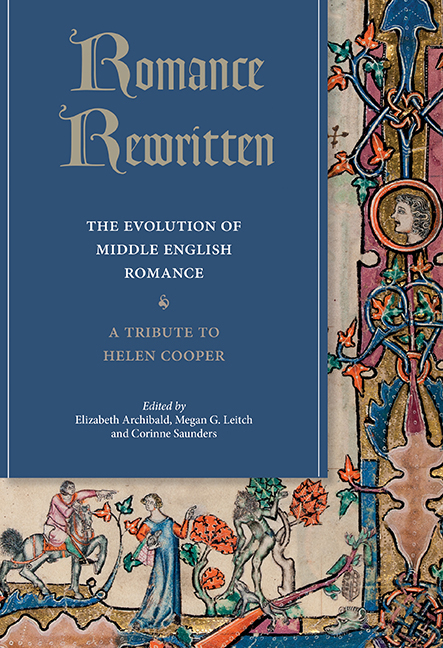Book contents
- Frontmatter
- Dedication
- Contents
- Notes on Contributors
- Acknowledgements
- Introduction. Middle English Romance: The Motifs and the Critics
- I Romance Disruptions
- 1 Medieval Romance Mischief
- 2 Rewriting Chivalric Encounters: Cultural Anxieties and Social Critique in the Fourteenth Century
- 3 Malory's Comedy
- II Romance and Narrative Strategies
- III Romance and Spiritual Priorities
- IV Late Romance
- Works Cited
- Index
- Volumes Already Published
2 - Rewriting Chivalric Encounters: Cultural Anxieties and Social Critique in the Fourteenth Century
from I - Romance Disruptions
Published online by Cambridge University Press: 17 October 2019
- Frontmatter
- Dedication
- Contents
- Notes on Contributors
- Acknowledgements
- Introduction. Middle English Romance: The Motifs and the Critics
- I Romance Disruptions
- 1 Medieval Romance Mischief
- 2 Rewriting Chivalric Encounters: Cultural Anxieties and Social Critique in the Fourteenth Century
- 3 Malory's Comedy
- II Romance and Narrative Strategies
- III Romance and Spiritual Priorities
- IV Late Romance
- Works Cited
- Index
- Volumes Already Published
Summary
One of the many contributions of Helen Cooper's monumental study of romance motifs across the high and later Middle Ages and the Renaissance resides in its extensive substantiation of the purposeful engagement of individual adaptors or translators with the earlier material they rewrote. By considering such processes of (both same-language and different-language) reworking alongside the sophisticated appropriations of the great Elizabethan writers, The English Romance in Time posits the importance of ascribing active authorial status to the anonymous adaptors of medieval romance. Cooper's model of synchronic and diachronic differences in the usage and interpretation of motifs within and across time illuminates authorial agendas and cultural change on a broad chronological scale, but can also be applied to more restricted generic and historical developments. In this vein, this essay maps the development of three motifs which rose to unprecedented prominence in the composition and adaptation of fourteenth-century Middle English romances: those of the hostile challenger, the noble Saracen, and the ambivalent hero. These reworked motifs, I argue, contributed to the expression of some of the most important topical anxieties of the time: the alarming advance of the Ottoman Turks in Europe, Christendom's failure to establish hegemony in the East, and the corruption of chivalric ideals.
‘þer com a sarazin ful of rage’
The rise in currency of the hostile challenger motif, while finding ultimate aesthetic fulfilment in the late fourteenth-century Sir Gawain and the Green Knight, is reflected prior to that in the selection of Old French and Anglo- Norman chansons de geste which the adaptors of Middle English romance chose to appropriate. Notwithstanding its potential deficiencies, the extant manuscript evidence is compelling: of the nine Charlemagne verse romances in English to have reached us, six revolve around the figures of Saracen warriors – Otuel and his counterpart Ferumbras in the Otinel and Fierabras traditions – who travel to Charlemagne's court and threaten Christendom with martial annihilation. The motif's cultural and generic purchase is corroborated by the translational procedures operative in its transition from chanson de geste to romance form. For instance, in The Sultan of Babylon, which conflates La Destruction de Rome and Fierabras, the menace posed by the Saracen army accompanying Ferumbras is augmented both numerically (30,000 as opposed to 20,000 in Fierabras) and racially (in terms of its rather fantastical composition of Turks, Phrygians, Indians, Ethiopians, Macedonians, Venetians, etc.).
- Type
- Chapter
- Information
- Romance RewrittenThe Evolution of Middle English Romance. A Tribute to Helen Cooper, pp. 49 - 66Publisher: Boydell & BrewerPrint publication year: 2018



